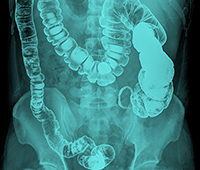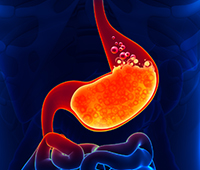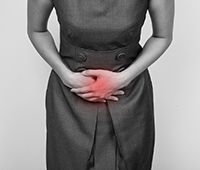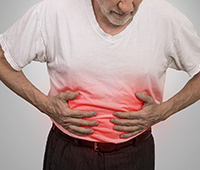WHAT IS Gastric tumor
- Definition
- Causes
- Symptoms
- Diagnosis
- Ayurvedic Tips
- FAQS
- References
Definition

1. What is GERD?
Acid reflux disease - also commonly known as Gastro-esophageal reflux disease (GERD) is condition in which acid from the stomach regurgitates or moves up into the esophagus (gullet).
2. How are fissures caused?
An anal fissure may occur when due to passing of hard or large stools during a bowel movement. Anal fissures typically cause pain and bleeding with bowel movements. One may experience spasms in the ring of muscle at the end of the anus (anal sphincter).
3. Can a fissure heal completely?
With appropriate treatment and following of pathya apathya, a fissure can heal completely. Although care should be taken not to be constipated and have high amount of fiber in food.
4. What is a kshar karma? How is it different from other surgery
Kshar karma is a specialized Ayurvedic surgical procedure that involves minimal blood loss and provides excellent relief in hemorrhoids and fistulas. It involves the applying of a sclerosing agent, such as apamarg kshar snuhi kshar etc.
It differs from conventional surgery as in it does not require anaesthesia, shows minimal blood loss and need not require inpatient admissions.
5. What are the risk factors of developing bowel incontinence?
A number of factors can increase the risk of developing fecal incontinence. These include:
- Age: It is more common in middle-aged and older adults.
- Female gender: Fecal incontinence is slightly more common in women. One reason may be that fecal incontinence can be a complication of childbirth.
- Nerve damage: People who have long-standing diabetes or multiple sclerosis — conditions that can damage nerves that help control defecation — may be at risk of fecal incontinence.
- Dementia: Fecal incontinence is often present in late-stage Alzheimer's disease and dementia.
- Physical disability: Being physically disabled may make it difficult to reach a toilet in time. An injury that caused a physical disability also may cause rectal nerve damage, leading to fecal incontinence. Also, inactivity can lead to constipation, resulting in fecal incontinence.
6. What exercises can be done to have better control on the motions?
Certain asanas that help strengthen the pelvic floor (muscles around the anal opening) are recommended for better control over the anorectal area. These are -
 Utkatasana
Utkatasana Virabhadrasana
Virabhadrasana Ananda Balasana
Ananda Balasana Shlabhasana
Shlabhasana
7. Can celiac disease lead to anything serious?
Untreated, celiac disease can cause the following complications:
- Malnutrition: The damage to your small intestine means it can't absorb enough nutrients. Malnutrition can lead to anemia and weight loss. In children, malnutrition can cause slow growth and short stature.
- Calcium loss of calcium and low bone density: Malabsorption of calcium and vitamin D may lead to a softening of the bone (osteomalacia or rickets) in children and a loss of bone density (osteoporosis) in adults.
- Infertility and miscarriage: Malabsorption of calcium and vitamin D can contribute to reproductive issues.
- Lactose intolerance: Damage to your small intestine may cause you to experience abdominal pain and diarrhea after eating lactose-containing dairy products, even though they don't contain gluten. Once your intestine has healed, you may be able to tolerate dairy products again. However, some people continue to experience lactose intolerance despite successful management of celiac disease.
- Cancer: People with celiac disease who don't maintain a gluten-free diet have a greater risk of developing several forms of cancer, including intestinal lymphoma and small bowel cancer.
- Neurological problems: Some people with celiac disease may develop neurological problems such as seizures or peripheral neuropathy (disease of the nerves that lead to the hands and feet).
In children, celiac disease can also lead to failure to thrive, delayed puberty, weight loss, irritability and dental enamel defects, anemia, arthritis, and epilepsy.
8. Who gets affected by pancreatitis?
Acute pancreatitis is more common in middle-aged and elderly people, but it can affect people of any age. Men are more likely to develop alcohol-related pancreatitis, while women are more likely to develop it as a result of gallstones.
9. What are the common causes of developing ulcers in stomach?
Common causes of peptic ulcers include -
- Long-term use of non steroidal anti-inflammatory drugs (NSAIDs)
- An infection with the bacteria Helicobacter pylori (H. pylori)
- Rare cancerous and/or noncancerous tumors in the stomach, duodenum, or pancreas
Addtionally, intake of alcohol and smoking also increase the chances of having a gastric ulcer.
10. What causes hemorrhoids?
Swelling in the anal or rectal veins causes hemorrhoids. Several factors may cause this swelling, including -
- Chronic constipation or diarrhea
- Straining during bowel movements
- Sitting on the toilet for long periods of time
- A lack of fiber in the diet
Another cause of hemorrhoids is the weakening of the connective tissue in the rectum and anus that occurs with age.
Pregnancy can cause hemorrhoids by increasing pressure in the abdomen, which may enlarge the veins in the lower rectum and anus. For most women, hemorrhoids caused by pregnancy disappear after childbirth.
Disclaimer: The information on this page is not intended to be a substitute for professional medical advice. Do not use this information to diagnose or ayurvedic treatment of gastro-intestinal-diseases and/or gastric tumor without consulting the doctor. Consult your physician before beginning an exercise regime. "While we have products /ayurvedic medicines for gastro-intestinal-diseases and/or gastric tumor, you must consult an authorized physician before taking any of the products. For more information on products, visit www.dabur.com or call 1800-103-1644"
Causes
Symptoms
Diagnosis
Ayurvedic Tips
FAQS
References
Know more on Gastro Intestinal diseases




